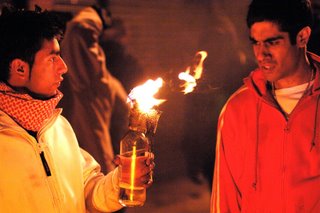
The success of the far-right British National Party (BNP) in the recent local elections in England, in which it more than doubled its council seats, was an ominous sign of a rise in public anti-Muslim sentiment. The BNP has made a campaign against Muslims part of its platform.
The new TV film-length drama “Bradford Riots” reminds us of the potential for violence when such far-right groups target cities with large Muslim populations. The drama has been released on DVD, and has been screened on Channel 4 and repeated twice on its sister channel More4.
The film is based on the 12-hour riots by Asians in the northern English city of Bradford in July 2001, which were the worst rioting on mainland Britain for two decades. The trigger to the riots was a planned march by the National Front (NF). Although Bradford council banned the march, many NF supporters turned up.
In the aftermath of the riots, courts handed down severe sentences, with 191 people receiving prison terms totalling 510 years. The film’s writer and director Neil Biswas has no doubt that the harshness of the sentences resulted from a hardening of attitudes towards Muslims after the September 11 attacks in the USA.
The film centres around university student Karim (played by Sacha Dhawan) who is back home in Bradford for the summer vacation. Through his eyes we see the problems of deprivation and unemployment faced by his peers who remain in the city. One friend, Aki (Syed Ahmed), has become a drug dealer.
Karim’s older brother Faisal (Ace Bhatti) runs the family textile business and is resentful of their father Azad (Victor Banerjee) paying large amounts for Karim’s university education, while Faisal has a wife and young son to support.
The film shows the gap between the generations, with the older generation opposed to the rioters. Karim gets caught up in events and joins in throwing stones at the police, partly because he is incensed that they declined to intervene when a friend of his was badly beaten up by NF supporters. When Faisal comes out to find Karim he too is enveloped in the riot and hits a policeman in self-defence.
Although Karim at first denies to his father that he was present at the riots, his face is among those published by the police who want rioters identified. Azad insists that his son give himself up to the police.
Karim’s lawyer advises him to plead guilty, confident that with his clean record and exemplary references from his university he will be treated leniently. But the judge sentences him to five years. Karim is placed in a cell with a racist white cellmate who taunts him about his Muslim faith. His final collapse comes when he learns that Faisal has been seized by the police in a nighttime raid on his home.
Sacha Dhawan says he was keen to give Karim a strong identity and individuality because “at the end of the day, I feel that what the young Muslim community lack is identity, in that people just categorise them by their religion.” In court, “you want the judge to look at him, to look at his case personally, and realise this is a kid who shouldn’t go to prison.”
Susannah Tarbush
Saudi Gazette, 16 May 2006

No comments:
Post a Comment